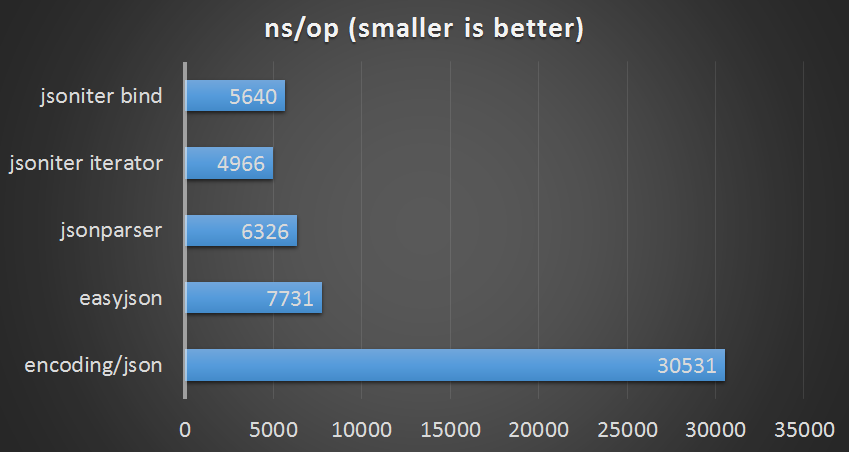mirror of
https://github.com/json-iterator/go.git
synced 2024-11-30 08:36:43 +02:00
2.2 KiB
2.2 KiB
jsoniter (json-iterator) is fast and flexible JSON parser available in Java and Go
Why jsoniter?
- Jsoniter is the fastest JSON parser. It could be up to 10x faster than normal parser, data binding included. Shameless self benchmark
- Extremely flexible api. You can mix and match three different styles: bind-api, any-api or iterator-api. Checkout your api choices
- Unique iterator api can iterate through JSON directly, zero memory allocation! See how iterator works
Show off
Here is a quick show off, for more complete report you can checkout the full benchmark with in-depth optimization to back the numbers up
Bind-API is the best
Bind-api should always be the first choice. Given this JSON document [0,1,2,3]
Parse with Go bind-api
import "github.com/json-iterator/go"
iter := jsoniter.ParseString(`[0,1,2,3]`)
var := iter.Read()
fmt.Println(val)
Iterator-API for quick extraction
When you do not need to get all the data back, just extract some.
Parse with Go iterator-api
import "github.com/json-iterator/go"
iter := ParseString(`[0, [1, 2], [3, 4], 5]`)
count := 0
for iter.ReadArray() {
iter.Skip()
count++
}
fmt.Println(count) // 4
Any-API for maximum flexibility
Parse with Go any-api
import "github.com/json-iterator/go"
iter := jsoniter.ParseString(`[{"field1":"11","field2":"12"},{"field1":"21","field2":"22"}]`)
val := iter.ReadAny()
fmt.Println(val.ToInt(1, "field2")) // 22
Notice you can extract from nested data structure, and convert any type to the type to you want.
How to get
go get github.com/json-iterator/go
Contribution Welcomed !
Report issue or pull request, or email taowen@gmail.com, or 
